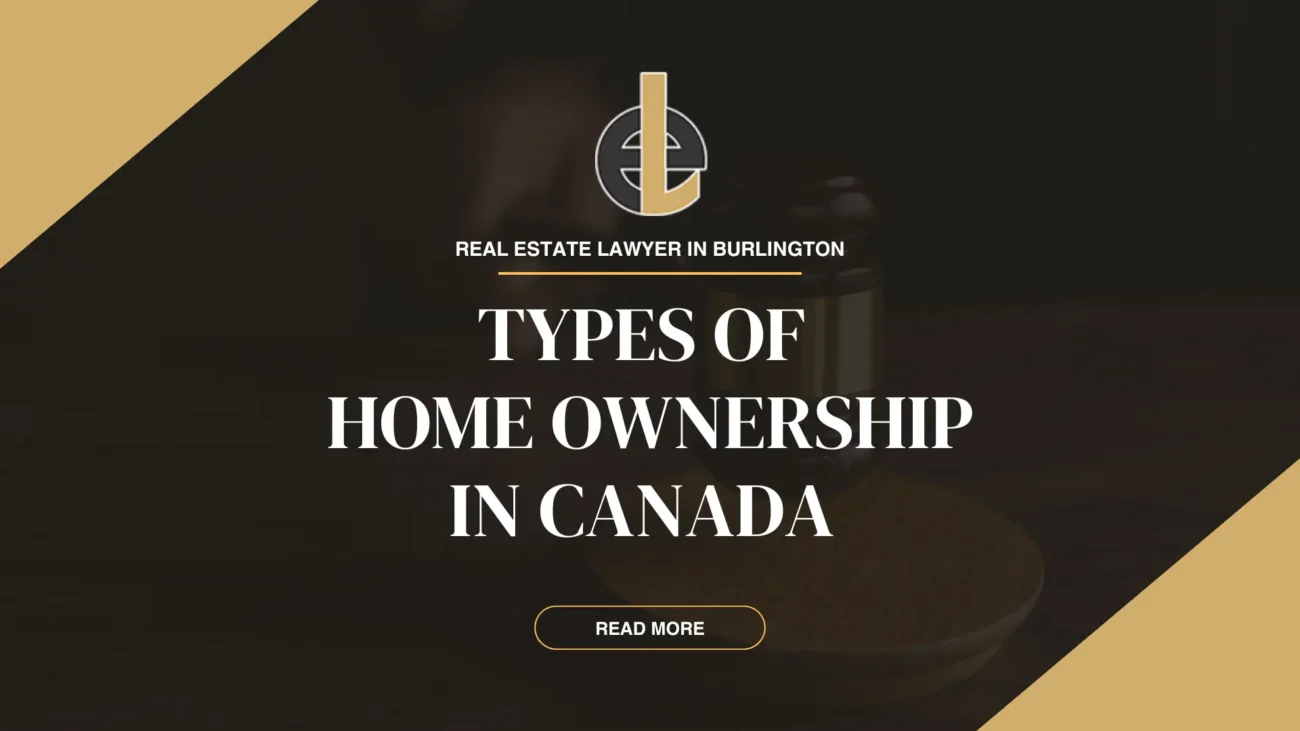
Buying a home in Canada does not always mean a house, as there are other options available. Similarly, there are also different types of home ownership structures. The way you own your property legally and the title registered to it depend on various factors. Real estate lawyers in Burlington can help you figure out the specifics of registering the title and legal formalities. In the meantime, you need to understand the different ownership structures in Canada.
There are various legal forms that homeownership can take. Moreover, different types of ownership have different legal implications and financing considerations. The specifics of the ownership model include key insights every property buyer must know to avoid any payment or legal problems down the line. Each type of ownership also comes with its own rights and responsibilities. There is also a specific way of financing and transferring down the line that you should be aware of. Read on.

In Canada, freehold is the most common form of homeownership, involving the buyer owning the building as well as the land it is on. If you own a freehold property, you get sole control of it and any decisions regarding using the space. Of course, you still need to adhere to zoning laws and other local regulations. Freehold ownership is a great example of having both control and responsibility, financial and legal.
Bottom Line: With freehold ownership, you can use the property how you please and have no monthly maintenance fee obligations. Financing can be easier since freehold is one of the popular types of home ownership. Then again, the upfront payment can be steep, and you also bear the entire expense of taxes, insurance, and maintenance.
A leasehold allows you to own a house or another structure, but you don’t own the land it is on. A third party will lease the land instead, like a private landlord, an indigenous party, or even the government. Buying this type of property can be affordable, but you may face difficulty in getting financing for shorter lease terms.

Leasehold ownership is less common than freehold ownership. They key reason: lack of complete autonomy and the uncertainty about resale down the line.
Bottom Line: Leasehold ownerships are less popular in Canada as the buyer does not own the land that hosts the property. It is vital to note that you may have limits for a renovation and a tricky resale in the future. That said, it is an affordable option as the cost of the land is not an obligation.
A condo (strata) is one of the types of property ownership where you own a unit in a residential complex. This complex can be a townhouse or a high-rise building where residents share the common spaces like elevators and lobbies.
Condo ownership also comes with a monthly maintenance fee for each resident, given to management to maintain upkeep. The total fee amount always varies, primarily depending on the amenities offered and the building itself.
Owning a condominium often means having to comply with the building/complex bylaws, such as having pets, parking cars, and renting. Condos offer lease control compared to freehold and leasehold properties.
Bottom Line: Condo ownership in Canada usually means finding a small home in a populated urban area without spending extensively. You can also be free of worrying about the responsibilities of timely maintenance. However, you own and control only one unit or section and have limited control over decisions.
Co-operative housing (also known as co-op ownership) varies significantly from other types of property ownership in Canada. Co-op residents do not ‘own’ a property, but buy shares of a residential property from a non-profit organization. Their share not only gives them a say in property management (renovations and regulations), but they can also occupy a unit to call home.
It can be tough to find financing since traditional lenders prefer traditional title-based property deals. You can consult a Milton’s real estate attorney or a law firm in any area you are interested in co-op housing before you proceed. They can ensure that you are making a sound investment now and for the future.
Bottom Line: Co-operative housing can be affordable depending on how much you have to invest. Having a better say in management helps enhance satisfaction and boosts a sense of community. On the other hand, you will find few lenders willing to finance a share instead of a title-based real estate.
Understanding the types of home ownership as a Canadian homebuyer is the first step in the process. How you own that property is also vital to determine what your budget, right, and responsibilities will be.
Sole ownership (also known as registered ownership) involves a single person as the owner of the property on the title. The sole legal owner purchases or finances the real estate independently as well, and has complete autonomy over the decisions to make changes to it (according to law), refinance it, sign a title transfer, and sell it down the line.
It is crucial to work with an experienced law firm in Burlington or anywhere else where the property is to legally confirm who gets the property if something happens to the owner. This can help avoid prolonged property disputes or keep the home from falling into the wrong hands.
Co-ownership is simply defined by the word: two or more people owning a property and all the rights that follow. Different types of ownership options are present, and this is more common amongst family and friends who can combine resources and own a home in an expensive housing market.

Legal help is also necessary in this case, even more so, in order to smooth out each investing party’s registration and rights. Shared ownership can be further divided into two types of arrangements:
All investors in a joint tenancy have equal shares in the real estate, which makes it a common choice for couples in Canada. Regularly reviewing your estate plan is vital to ensuring safety. If one owner passes, the right of survivorship states that their co-owners get their share.
Tenants in common involve multiple parties, but the shares can be unequal. It is a more common choice for friends or unrelated investors who can transfer or sell their shares at any time. A will determines who gets an investor’s share if they pass away (which is the next of kin if there is no will).
Trust ownership is a legal real estate process where a trustee, who is stated as the registered owner on the property title, holds the property on behalf of a beneficiary, who gets the ultimate say in the control of the asset (and gets the perks). This is one of the cases where home buyers need a real estate lawyer, as a trust ownership is usually chosen for will and estate planning purposes. A good example of trust ownership is purchasing and registering the property under a child’s name (who is not yet of legal age to manage the property).
How do you know which of the types of home ownership is right for you? Are your interests and rights secure in the agreement contract you will sign to get ownership? These are the very aspects of purchasing a property in Canada, regardless of the type of ownership or share, where you need legal help from Estofa Law to complete the process seamlessly and avoid any problems down the line. Reach out to us today, and we will connect you to a seasoned real estate attorney to help you make the right decision.
5500 North Service Road Suite 300-27, Burlington, ON L7L 6W6
Estofa Law is a real estate law firm dedicated to serving clients in Burlington, Oakville, Milton, Hamilton, and Toronto.
Copyright © 2025 | Estofa Law Professional Corporation | All Rights Reserved